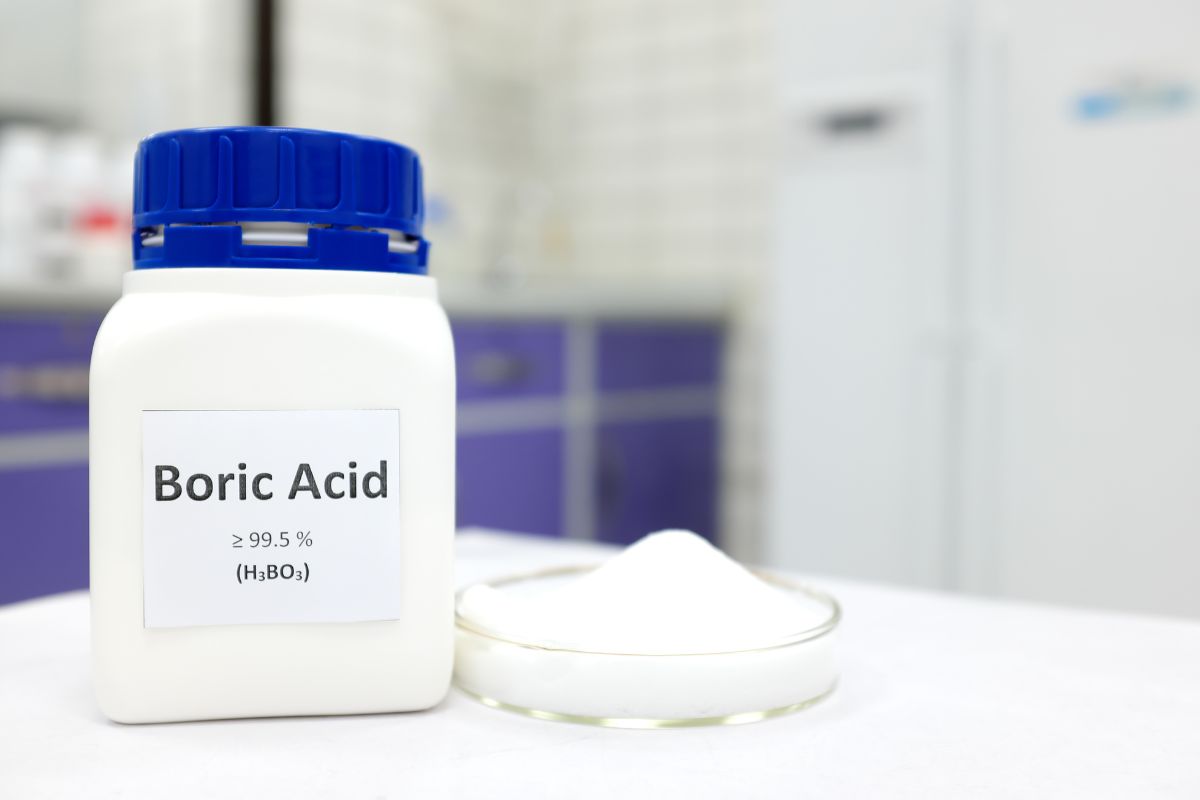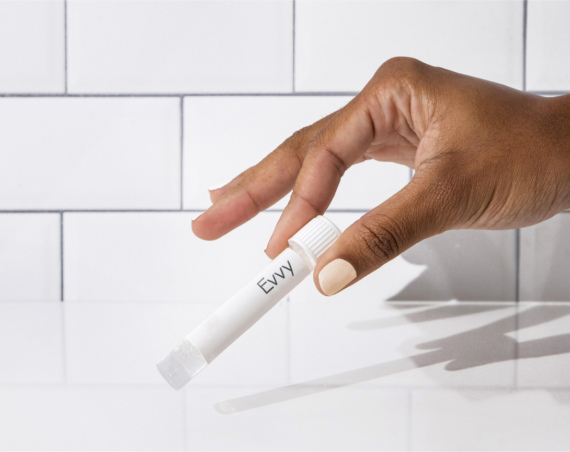Vaginal infections can be highly uncomfortable, and if you suffer from them frequently, they can seriously affect your quality of life.
Quick and effective treatment is necessary to ensure you can enjoy life without irritation.

Boric acid has long been used to treat various infections. Boric acid suppositories have been shown to act as an effective treatment for vaginitis.
Affordable and easy to use, a course of boric acid treatment can clear an infection in potentially just 7 days.
However, it’s natural to feel nervous about inserting suppositories into your vagina!
In this guide, we hope to teach you everything you might want to know about boric acid, and why you should consider it for treating vaginitis.
What Is Boric Acid?
Boric acid is a compound that is found in nature and has been recognized for centuries for possessing antifungal and antimicrobial properties.
In recent years, boric acid has become an increasingly popular treatment for vaginal infections, particularly bacterial vaginosis and chronic yeast infections.
Composed of oxygen, boron, and hydrogen, boric acid is a water-soluble powder that can be found in both crystal and powder form.
As well as vaginal infections, boric acid has been used to treat athlete’s foot, diaper rash, and insect bites. It’s available as an over-the-counter solution.
In the treatment of vaginal infections, boric acid is offered as a suppository.
These capsules can be inserted in the vagina where they dissolve, releasing the boric acid which can then prevent any further yeast growth.
Boric acid is a relatively fast-acting treatment, and symptoms can start to lessen within a few days.
What Are Boric Acid Suppositories Used For?
As an antifungal and antibacterial compound, boric acid is used to treat vaginitis.
The antifungal and antimicrobial properties can help restore the natural pH balance of the vagina, fighting symptoms such as irritation and inflammation.
Vaginitis is a term used to refer to various disorders that can cause the vagina or vulva to become inflamed.
Vaginitis is frequently caused by infection, or by a change in the bacteria balance in the vagina.
The symptoms of vaginitis vary, but the most common complaints are itching, pain, pain when you urinate, and unusual discharge.
Vaginitis can also cause a bad odor, and you may notice visual changes to the vagina or vulva, such as redness or swelling.
When left untreated, vaginitis can last for months and even years, but treatment can clear the issue in just a few weeks.
Vaginitis can sometimes be confused with urinary tract infections (UTIs) due to similar painful and irritating symptoms.
However, as UTIs are caused by an infection in the urinary tract, not the vagina, they aren’t considered to be vaginitis.
BV (Bacterial Vaginosis)
The most common form of vaginitis is BV or Bacterial Vaginosis. This is caused by an imbalance of bacteria in the vagina.
BV isn’t a form of STI, but it is often linked to sex with a new partner, and it can increase the likelihood of getting an STI.
After a BV diagnosis, you are likely to be treated with antibiotic tablets, although some doctors will prescribe a gel or cream.
Although these treatments can be highly effective, bacterial vaginosis will often come back within a few months of initial treatment.
If BV is frequently recurring (more than 4 times in 1 year), you may be prescribed long-term treatment with an antibiotic gel.
Studies into the treatment of BV with boric acid have been positive, particularly when used alongside other treatments.
However, more research is needed before we can be conclusive about the efficiency of using boric acid to treat BV.
Yeast Infections
Yeast infections are highly common, and up to 75% of people with vaginas are likely to experience a yeast infection at some point in their lifetime.
Chronic yeast infections are rarer and result in a person experiencing yeast infections several times a year.
Boric acid is a common treatment for yeast infections (vulvovaginal candidiasis). Evidence suggests that boric acid can be a safe and effective treatment.
Further studies have also shown that boric acid can be an effective treatment for recurring yeast infections.
STIs (Sexually Transmitted Infections)
BV and yeast infections often present similar symptoms to STIs, but both these common complaints are not considered STIs.
There are various types of STIs and many of them cannot be treated with boric acid.
However, one of the most common sexually transmitted infections is trichomoniasis, sometimes known as trich.
This is caused by the trichomonas vaginalis parasite. Early research does seem to indicate that boric acid might be a potential treatment for trichomoniasis.
How Do You Use A Boric Acid Suppository?
You can purchase boric acid suppositories ready-made, or you can make your own with boric acid and gelatin capsules.
It’s typically easier to buy a ready-made capsule and these can be picked up over the counter for an affordable price.
Boric acid suppositories can be found at most drugstores, and they’re also available online.
If you choose to make your own, you’ll need boric acid powder and size 00 gelatin capsules. The standard daily dosage of boric acid is 600 mg per day.
Both homemade and pre-made boric acid suppositories need to be inserted into the vagina.
To use a boric acid suppository:
- Choose a time of day to insert the suppository, and keep to a schedule. Many people find it best to use the suppository before bed.
- Wash your hands thoroughly before you begin.
- The suppository can be inserted at any angle, so find a way that is comfortable for you. If you’re struggling to insert the suppository, try lying on your back with your knees bent.
- Use your fingers or a provided applicator to insert the suppository. It needs to go as far into the vagina as it can comfortably go.
- If you used an applicator, remove it and throw it away.
- Wash your hands thoroughly after interesting the suppository.
- Discharge or leaking is normal after inserting a suppository, so consider wearing a panty liner.
Depending on the brand of boric acid suppository, the application method might be slightly different. Carefully read the guidelines for insertion before using any boric acid suppository.
It’s normal to experience mild pain or irritation after the initial insertion of the suppository. If it doesn’t fade, contact your healthcare provider.
Boric acid can be a quick-working medication, and you may start to feel an improvement after just one application.
However, it’s important to finish the course of medication to ensure the infection is cleared.
Is Boric Acid Safe To Use?
Boric acid has been used to treat vaginal infections for more than 100 years, and there have been numerous studies showing its effectiveness.
Boric acid supplements are largely considered safe to use, with minimal side effects.

However, there are a few potential side effects to be aware of when using boric acid.
You may feel a burning sensation when you first insert the capsule or experience redness around the vaginal area. After insertion, watery discharge is common.
The side effects are minimal and should fade quickly. If the suppository causes increased or persistent discomfort, stop usage immediately, and speak to a healthcare professional.
Boric acid should not be used by pregnant women. If you’re pregnant and you have a yeast infection, speak to your doctor about other treatment methods.
It’s also best to avoid boric acid suppositories if you’re breastfeeding. Boric acid should also not be used if you have an open wound in or around the vagina.
Boric acid can not be ingested orally. It should only be taken as a suppository and inserted into the vagina.
Finally, doctors may recommend regularly using boric acid suppositories to treat a recurrent yeast infection.
Instead of a daily dosage, a suppository should be used once or twice a week, with the treatment course generally lasting 3 to 4 months.
This is intended to prevent further infections. Speak to a doctor before using boric acid suppositories as a preventative.
Are Borax And Boric Acid The Same Thing?
As we’ve mentioned, you can make your own boric acid capsules if you have access to boric acid powder and gelatin capsules.
If you do decide to make your own, it’s vital that you use boric acid, not borax.
Borax and boric acid are not the same things, although they are based on the same compound.
They’re both borates, but borax is sodium borate, and boric acid is hydrogen borate. Borax is essentially straight from the earth, while boric acid has been processed and refined.
Can Any Boric Acid Be Used To Treat Vaginal Infections?
Boric acid has many applications outside of fighting infections.
It’s often used around the home as a natural insecticide and is an effective way of killing cockroaches and other infestations.
Boric acid is also used in some cleaning products. Other borates and types of boron, including borax, also have applications in the home.
If you plan on using boric acid to treat a vaginal infection, it must be 100% boric acid. Do not use another form of boron.
Any pre-made boric acid suppositories should contain 100% boric acid. The only other ingredient used should be the capsule.
This will generally be made of gelatin, but some brands use a vegan alternative. The capsule should contain no fillers, dyes, or additives.
Can I Have Sex After Using A Boric Acid Suppository?
If you’re using boric acid suppositories to treat a vaginal infection, you should avoid having sex until the infection has cleared.
Yeast infections and bacterial vaginosis are not considered sexually transmitted infections, but they are often related to new sexual partners.
Having sex can also cause an existing infection to get worse, and you might notice increased irritation or inflammation.
Your vagina won’t be feeling at its best anyway, so it’s best to avoid anything that can further upset the balance.
Boric acid suppositories can also cause mild issues in male partners if they engage in sex shortly after the suppository has been used.
Ideally, if you’re using boric acid suppositories to treat a vaginal infection, wait 24 to 48 hours after finishing the treatment course to resume sexual activities.
Final Thoughts
Boric acid is a naturally occurring compound that has antifungal, antiviral, and antibacterial properties.
It can be used to effectively treat vaginal infections and is a common treatment for yeast infections.
Boric acid can be purchased over the counter, and suppositories are inserted into the vagina. A boric acid treatment course typically lasts 7 days.
These suppositories help restore the natural bacterial balance of the vagina, reducing redness and inflammation, and easing itching and discomfort.
If you’re suffering from a suspected yeast infection, speak to your doctor about using boric acid as a treatment.
Boric acid can also be used to treat recurring yeast infections, but speak to your doctor before using boric acid as a preventative.



